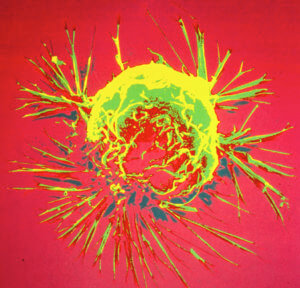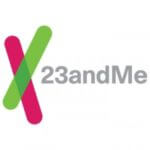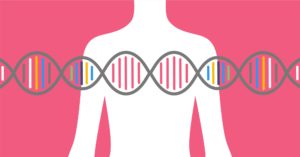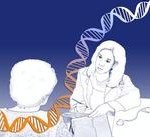This is the second time that direct-to-consumer genetic-testing company 23andMe has offered screening for the mutations linked to breast cancer. The difference now from when it was yanked off the market in 2013? FDA approval.
That’s huge.
As a genetic counselor for many years I’ve evaluated patients for breast cancer risk, and I recently had testing for BRCA and dozens of other susceptibility genes. During my breast cancer journey, I encountered several health care professionals unfamiliar with the fact that many genes contribute to risk, or how to get tested.

Even the BRCA genes, which make headlines regularly when they affect celebrities, are misunderstood. In Oregon a 36-year-old woman filed a $1.8 million lawsuit against a nurse practitioner and surgeon going ahead with her double mastectomy and hysterectomy despite the lab report stating that her gene variant was not known to be pathogenic. (The story is at Genome Web, behind a paywall.) Testing was accurate; interpretation, not.
Limited understanding of genetics, by health care practitioners, patients, and DTC test-takers, is my primary concern following the return of the BRCA test. While the 23andMe reports sent to consumers link to great technical resources like Genetics Home Reference and Gene Reviews (I’d add Online Mendelian Inheritance in Man), I worry that it isn’t enough, or that consumers simply won’t read the details. I’ve published 12 editions of a human genetics textbook, and from that experience I know that some concepts in genetics are just too complex to capture in even the most engaging screen shot.
BRCA basics
The DTC test covers the three mutations in BRCA1 and BRCA2 that are most prevalent among people of Ashkenazi Jewish descent. Those mutations are particularly devastating because they alter the triplet “reading frame” of the gene’s DNA sequence, a little like inserting or removing a letter or two from this sentence and reorganizing the words into gibberish.
The BRCA genes encode proteins that are linchpins in DNA repair. The three mutations shorten the protein or prevent it from forming, allowing mutations in other genes to go unrepaired, and eventually the cell cycle veers out of control. That’s cancer.
Most familial breast and ovarian cancers among Ashkenazim today are due to one of these mutations because we’ve tended to marry among ourselves. And the risks of either cancer are high: for women with either of the two mutations in BRCA1 it’s 60 percent by age 60 and 83 percent by age 80, and for the lone BRCA2 mutation 33 percent by age 60 and 76 percent by age 80. But only 2.17 percent of Ashkenazim have one of these mutations.

In different populations, the most prevalent mutations differ, as do how likely they are to cause cancer (a measure termed penetrance). For example, one study showed that among 1,022 women in Colombia who do not have a family history of breast cancer, 7 percent had a mutation in BRCA1 or BRCA2 — but the four mutations common for them differ from the Ashkenazi trio. Colombian women with any of the four mutations face a 14 percent risk of developing cancer by age 70, compared to 3 percent for the general Colombian population. So the mutations are different, their prevalence higher, but penetrance lower, compared to the Ashkenazim.
It’s complicated. That’s why 23andMe cautions: “The relevance of each report may vary based on ethnicity.”
Warnings aplenty
FDA and 23andme clearly spell out the caveats and limitations of the DTC test.
Said Anne Wojcicki, 23andMe CEO and co-founder, in a news release, “This authorization is incredibly valuable for those who might not be aware of their Ashkenazi Jewish descent or aren’t familiar with their family history of cancer. But it’s important to understand that the majority of cancer is not hereditary, our test does not account for all genetic variants that can cause a higher risk of cancer, and people should continue with their recommended cancer screenings.”
FDA took it farther: “Consumers and health care professionals should not use the test results to determine any treatments, including anti-hormone therapies and prophylactic removal of the breasts or ovaries. Such decisions require confirmatory testing and genetic counseling.”
Other companies that offer BRCA tests under a doctor’s supervision (possibly online or on the phone) are jumping aboard the publicity train with deals, like the $99 test offer from Color Genomics that keeps popping up on my Facebook feed. The uptick in clinical (not DTC) testing for BRCA followed the Supreme Court ruling that Myriad Genetics doesn’t own the genes, in June 2013.
Why FDA’s turnaround?
The test from 23andMe is a mouthful: the Personal Genome Service Genetic Health Risk Report for BRCA1/BRCA2 (Selected Variants). Spit in a tube and send in a sample, then await results. It’s not as simple as a color change on a home pregnancy kit, as some news coverage implied.
Back in 2013, FDA halted 23andMe’s marketing of BRCA1/2 testing, even though the assay was clinically validated — a truncating mutation is easy to spot. It’s the interpretation of natural genetic variation that’s at issue. Stated the agency’s warning letter:

“For instance, if the BRCA-related risk assessment for breast or ovarian cancer reports a false positive, it could lead a patient to undergo prophylactic surgery, chemoprevention, intensive screening, or other morbidity-inducing actions, while a false negative could result in a failure to recognize an actual risk that may exist.”
But “false positive” and “false negative” aren’t the correct terms — the tests report the mutations accurately. It’s the meaning of a particular gene variant in a particular population that’s crucial. And the tests were never intended to detect or diagnose cancer. Even in a clinical setting, they’re used to send patients for further tests, like mammography or ultrasound, and if those deliver suspicious findings, biopsy.
 Still, since 2013, enough data have accumulated to convince FDA to greenlight the DTC test. Additional studies from 23andMe are claimed to have reconfirmed test accuracy and reproducibility, and shown that consumers understand what they’re ordering, how to interpret findings, and where to get more information. I don’t doubt that many consumers today are considerably more scientifically savvy than just a few years ago.
Still, since 2013, enough data have accumulated to convince FDA to greenlight the DTC test. Additional studies from 23andMe are claimed to have reconfirmed test accuracy and reproducibility, and shown that consumers understand what they’re ordering, how to interpret findings, and where to get more information. I don’t doubt that many consumers today are considerably more scientifically savvy than just a few years ago.
“We’ve come so far since 2013 and the FDA realizes that. Several trends allowed this to happen. First, people have become more proactive about managing their own health and want to find out more about it, often without involving intermediaries. Second, DNA testing has become more affordable and increasingly widespread and acceptable as a result. Third, the level of science behind these in-home DNA tests has improved dramatically,” Mehdi Maghsoodnia, CEO of Vitagene, told the Genetic Literacy Project.
Why more widespread testing?
Dr. Mary Claire King, a geneticist at the University of Washington, led the team that identified in 1990 what would be named the first breast cancer susceptibility gene, BRCA1, in families with multiple cases of early-onset cancers. But it was two of her papers from 2014 that seem to have impacted the FDA’s turnaround.
In the Proceedings of the National Academy of Sciences, King and colleagues found any of the three Ashkenazi mutations in 175 of more  than 8,000 Ashkenazi men in Israel — about 2 percent of them. Half of the families that had BRCA mutations didn’t have a history of breast or ovarian cancer — typically families too small for it to statistically show up. So all Ashkenazi should be tested, “integrated into adult primary care,” the researchers concluded.
than 8,000 Ashkenazi men in Israel — about 2 percent of them. Half of the families that had BRCA mutations didn’t have a history of breast or ovarian cancer — typically families too small for it to statistically show up. So all Ashkenazi should be tested, “integrated into adult primary care,” the researchers concluded.
The second paper, a Viewpoint in the Journal of the American Medical Association, seems to have gone a step farther in suggesting that “every woman,” at about age 30, should have a BRCA test for the three mutations, deemed “actionable” because surgery can prevent cancer by removing the affected organs. But such testing should be done “in the course of routine medical care.”
“Integrated into adult primary care” and “routine medical care” do not sound to me like spitting into a tube and learning results online. I’ve asked King for clarification but haven’t heard back, and her comment for NPR on the recent FDA approval was as truncated as the genes under discussion.
The idea of broader BRCA testing isn’t new. Wrote James D. Fackenthal and Olufunmilayo I. Olopade in Nature Reviews Cancer in 2007, “The important conclusion for clinicians is that it is likely most BRCA1 and BRCA2 mutations occurring in a clinical setting will be present in individuals with no family history of breast cancer.”
So I agree. Population-wide testing for BRCA mutations makes sense.
A case In which testing helped
I met one of my closest friends thanks to 23andMe’s BRCA gene testing.
In late 2012, Lisa’s 20-something son Justin sent a DNA sample to 23andMe “for fun.” Included in the company’s genotyping panel were the BRCA Ashkenazi mutations, and he had one. A mutual friend suggested Lisa see me for an unofficial genetic counseling session.
The case seemed clear: Lisa was Ashkenazi, with relatives who had breast or ovarian cancer. Her daughter Maya, a few years older than Justin, was about to take the bar exam so was kept in the dark for a bit, but eventually, when 23andMe repeated the tests and Myriad Genetics helped too, all gratis, she was brought into the conversation. And it turned out that Lisa’s Irish Catholic husband, Eric, had passed along the worrisome mutation! (I’ve changed their names.)
A whirlwind of emotions engulfed the family. Lisa was petrified, Justin confused, Eric disbelieving, and Maya enraged (although she passed the bar and didn’t have the mutation)!
 So now Eric and Justin are tested periodically for breast and prostate cancer, and Justin knows he can pass the mutation to a child. Maya and Lisa are relieved, although they understand that they can still develop cancer from mutations in other genes. Unfortunately the relatives they alerted dismissed the test results. But without the “just for fun” DTC testing, my friends likely would never have known about the increased cancer risk.
So now Eric and Justin are tested periodically for breast and prostate cancer, and Justin knows he can pass the mutation to a child. Maya and Lisa are relieved, although they understand that they can still develop cancer from mutations in other genes. Unfortunately the relatives they alerted dismissed the test results. But without the “just for fun” DTC testing, my friends likely would never have known about the increased cancer risk.
What’s the downside?
DTC BRCA testing can indeed lead to cancer diagnosis and treatment. But I see two downsides: a false sense of security and panic.
A false sense of security might arise if a consumer assumes that if she doesn’t have one of the three Ashkenazi mutations, she can’t develop breast or ovarian cancer. The mutations account for less than 0.1 percent of cases in other populations. And 23andme and FDA do warn about this repeatedly.
Panic may follow if a woman doesn’t realize that the three Ashkenazi mutations are associated with lower penetrance in other populations. Here’s where ancestry testing may be useful, something of which the testing companies are of course well aware.
Adding to the confusion is referring to a person with a BRCA mutation as a “carrier.” This word can denote a healthy person who transmits a communicable disease (typhoid Mary), an unaffected carrier of a single-gene recessive disease, or a person who inherits a cancer risk gene! “Carrier” in the cancer context is not as benign as in the others. We need a new term for folks who have BRCA mutations. For example, people who have a mutation that causes Huntington’s disease, but who don’t have symptoms yet, are called “pre-manifest.”
 I’m glad that the FDA announcement advises consulting a genetic counselor about BRCA testing (See Find a Genetic Counselor). The 23andMe website, as far as I can tell, still only mentions genetic counseling in one brief paragraph following advice to consult a primary care physician, but the engaging client stories for other conditions mention seeking genetics expertise.
I’m glad that the FDA announcement advises consulting a genetic counselor about BRCA testing (See Find a Genetic Counselor). The 23andMe website, as far as I can tell, still only mentions genetic counseling in one brief paragraph following advice to consult a primary care physician, but the engaging client stories for other conditions mention seeking genetics expertise.
Considering how much there is to know about genetics, and the fact that health care professionals do not always have the training or knowledge to answer questions from informed consumers, without the input of a genetic counselor or medical geneticist, DTC genetic testing is caveat emptor. Let the buyer beware!
Ricki Lewis has a PhD in genetics and is a genetics counselor, science writer and author of The Forever Fix: Gene Therapy and the Boy Who Saved It, the only popular book about gene therapy . Follow her at her website or Twitter @rickilewis.































